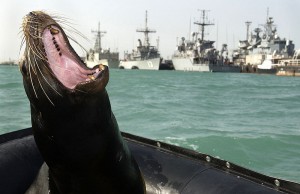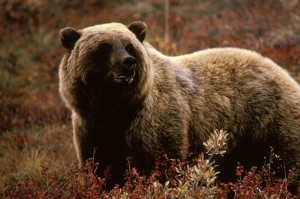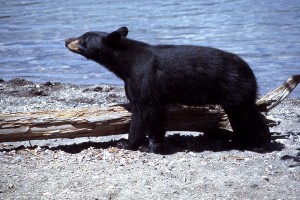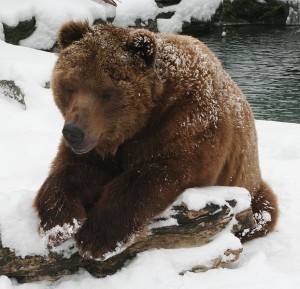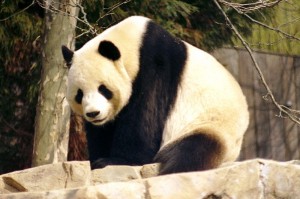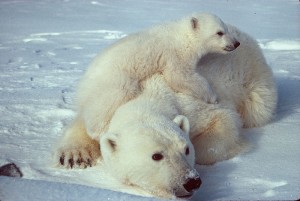I was stirring the stew on the firepit when I heard the knock.
At first I dismissed it as the wind, and did nothing. With the second rap, I thought of it as coincidence, and stirred all the harder, as if to banish it forcibly from thought. With the third, I feared it was a bear, come in the snowstorm by the drifting smell of cookery, and I snatched up my spear and hurried to the doorway. By the time the fourth thump came, I was shoving the rough driftwood hatch open, feeling it grind against the iced and slick snow-walls.
The figure beyond was no bear – far too small, too slight, even for a cub – and it jumped in surprise. Bulky, upright, small, dark in colour, with odd face markings, and textures that just didn’t match up. Its forelimbs were held upright, next to its skull, and it was making the strangest noises, a complicated cacophony that was half-lost in the blizzard.
I blinked as I listened. They sounded familiar. What were they…. words. Yes, that was it. Words. Were they English? I wasn’t quite sure. I’d taken up talking to myself a long time ago, a very long time ago, but this was strange. It was all too fast in some places, too slow in others, and some of the bits didn’t sound like other bits. Too much all at once. And if those were words – English words? – then this must be a human. Another human. Did I look like that? Strange indeed.
It had stopped its words, and was watching me. Warily, probably. I did have a spear pointed at it. Did I need to do that now? We had a lot in common – species, desire to avoid the cold, and probably hungry. I remembered the hunger quite well now.
“Come in,” I said, and I let the spear down (gratefully – it was heavy). “Stew.”
It was magical, watching that. I said some words and moved my arm and all of a sudden it wasn’t frightened anymore. Then we both walked inside, just like that. Can you believe that? Some words and all of that happens. Amazing.
My guest liked the stew, although it took me a while to figure this out. It was still hard to understand it. “Slower,” I said. “Slower.” It would nod, blink, eat some stew, and then start over again, still wrong in some odd way that threw its ever breath of air out of joint with my mind. Still, we made progress, and by the end of the meal we could understand each other half-decently as we sat on my furs next to the firepit. It had laid its gun to one side, out of the way. It looked much more complicated than mine, and seemed well-looked-after. It probably even still worked.
The first thing it asked after we’d established this was what was in the stew.
I thought for a while. What was the word? Ah, yes. “Mice.”
It looked surprised. “That’s a lot of mice. How many?”
I shrugged – another thing I hadn’t done for a long time. It came much more easily than conversation. “Lots? Can’t remember. Collected them before winter.”
“Cached them, huh? Are you that hard up for food?”
Another shrug, and something I thought I recalled mother saying once. “Every little bit… helps.”
The guest laughed, and the sound was the most alien I’d heard from it yet. It seemed too loud. “Hah, yes. Thank you for your mouse stew, stranger – and you shouldn’t stay a stranger, for giving me somewhere to hide from that snowstorm.” He stretched out his back, rubbing at the base of the spine. “”What’s your name?”
That particular detail came to me more easily than anything else I’d struggled with. “John.”
“It’s good to meet you, John,” said my guest. “Tim.”
I thought for a moment. “Yes?” I asked.
It shook its head. “No, sorry. I’m Tim. My name is Timothy.” He – that was a man’s name, it must be a man – looked at me in a way that I thought was odd. “When was the last time you saw someone else out here, John?”
“Not sure. Hard to keep track of time.” A phrase leaked back into my head. “’Land of the Midnight Sun.’ Hard to say. A long time.”
“How? You can’t be more than a few days north from Fairbanks.”
I stared at him, and he must have sensed my blankness. “Fairbanks? You know, Fairbanks, Alaska?”
“Alaska?” That was maybe the strangest word I’d heard yet.
“Alaska. The United States of America.”
All the words in the sentence I understood, yet together they meant nothing. I shook my head. “No.”
Insofar as I could read expressions – there were so many muscles moving on his face, all dancing and jumping – he looked very… something. I’m not sure what. “How do you not know that? You’re not native, so you sure as hell weren’t born out here, and you don’t even know that you’re in the state of Alaska? You’ve never heard of the US?”
More sensible words that added up into senselessness. “No. I haven’t.”
He – Tim, yes that was it – slumped, and his body language spoke to me more than his face had. I remembered something now. “You got lost?” I prompted.
He nodded. “Yes, and I’m damned ashamed to admit it. Flew north out of Fairbanks and landed on a lake, was just planning on a little bit of winter hunting. Storm came up out of nowhere, faster than I could blink – not a single warning or hint. It was there, I was stuck in a whiteout, and by the time it cleared up enough for me to move the plane was gone. Damned if I know how, but the temperature’d dropped like a stone. So I struck out east, towards where I’d seen some trees on landing, – get any shelter you can, you know – must’ve got turned around, kept walking to keep breathing, and then I stumbled into your house. Probably saved my life. Thanks again, by the way.”
“You are welcome.” Old memories were thawing inside my head, bit by bit, revealing frail and chilly contents. “On the lakeshore,” I asked, hunch growing stronger, “was there a rock? A point?”
“A what?” he asked, puzzled.
“A rock, a point.” I thought over my words again. “A rock on a point. A big rock. A big round rock. On a point,” I clarified.
Tim got that strange look on his face again – probably confusion – and then it melted into something else. “Yes. Yes, there was. I tied the plane to a tree right next to it. When the snow calmed down, it was gone. Just gone – not a trace of the line left. Or the tree.”
Certainty filled me, the same feeling I got when I had a deer standing in my sight, bow in hand, with the wind at my back. “You moved,” I said.
He looked confused again. “No, I didn’t. I’m not an idiot, I stayed right where I was and hunkered down next to the rock.”
“No, no, no,” I said, firmly. I smacked my right hand on the floor near his foot, making him jump. “You were here,” I said. My other hand came down hard, across from its brother. “I am here. The snow came, and then –“ I swept my right hand over to meet its brother “–it brought you here. To me.”
“Forgive me for saying this, John,” he said, almost slowly enough to be clear and sound for once, “but you aren’t making any sense.”
“I got lost too,” I said.
There was a long silence then. I used the time to clean out the rest of the stewpot, seeing that he’d had his fill. It was a good stewpot, made out of soapstone. It had lasted for a long time, but was scarcely my first. With each replacement, I’d gotten better at the fiddly bits of the carving, and by now they were quite pleasant to look at.
“So you’re saying,” said Tim, as I scraped out the last of the meat – almost as if he’d been waiting for it – “that you got lost, in the same place, and it brought you here, and now the same thing happened to me?”
I nodded. It had been a long time since I’d done that, and it felt good. My sharing of the stewpot had garnered something quite useful after all.
“Tell me why I should believe you, and not write you off as an old survivalist who’s spent too much time with no one to talk to but caribou.”
“Caribou?” I asked.
“You can’t honestly not know about caribou. They walk past here every six months! Your spoon is made from one of their antlers!”
I looked at the handle of the spoon, and recognition came. “The deer?” Caribou was an odd word. Why rename a deer?
Tim’s movements were growing more jerky and impulsive. I must’ve been frustrating him. “It doesn’t matter. What are you trying to tell me? That the snowstorm took me to… never-land or something? Narnia? Make sense or show me some proof.”
I looked down into the stewpot, thoughts bubbling and hissing inside my skull. It had been a very long time, but I believed I knew something that would make him change his mind.
“Wait,” I said. I set the stewpot to one side and arose, then began to rummage through the big woven-branch hamper I kept my things in. There was something in there that couldn’t be found where he came from, something very different from the old, younger place that I’d been in before I came here. At least, I thought it was.
It was at the bottom of the hamper, because it was very heavy. I used it as part of my sledge when I packed up home and moved. With some difficulty, I pried it loose and bundled it into my arms, then brought it to him. “Here,” I said, and placed it upon the ground.”
“Polar bear skull,” he said immediately. “Big one –“ and then he stopped, and began to touch and examine it. I let him look, and waited. Time was long, and we had much of it.
At last he raised his eyes from my skull, and spoke words again. “This isn’t a normal bear,” he said.
I thought back again to those long-ago times, and recalled the bears I’d seen. Were they normal? “No,” I agreed, deciding that they might’ve been. At the time.
“It’s too big. Much too big. And this isn’t a fossil. Either you killed the biggest bear ever to live in the history of the world, John – and not more than a few days from Fairbanks – or you’re not making up everything you’re telling me. And I can’t think why you would. One way or the other, something’s wrong here.” He was having trouble keeping his eyes from my sledge-base, they kept alighting upon it, like a nervous mother bird unwilling to leave its nest. “And of course, there’s the extra eye sockets.”
Bears with four eyes had extra eyes? I’d forgotten that – was he really telling the truth? “More proof?” I asked, mind already feverishly ransacking those old memories once more, comparing them to the contents of my home.
“Please.”
The hamper was carefully sorted through, and other tokens and emblems came out. My knife, carved from one of the teeth of the whales that I’d found stranded on a shore, long ago – a score or so, I recalled, and I’d never seen anything like them since. The furs we squatted on became an example – the woolly pelt from a calf of one of the rhinoceroses that roamed near here in the late winter, claimed from its owner after I found it dead in a snowdrift. Normal things, strange things, and each examined and explained haltingly to this odd man, with odd words.
There was another very long silence after that. It was very strange – it felt misshapen, unpleasant. Not at all like normal.
“So it’s never-land then?” he asked after a time.
“I do not understand,” I said.
“Narnia then? Where am I? You’ve got mutant bears and giant killer whales and some kind of woolly rhinos. Maybe you’re a head case with one weird trophy, but with three? This is too much. What the hell is this place?”
“I do not,” I said carefully, “understand.”
Tim was staring at me again. “You’re nuts. I don’t care how long you’ve been stuck out here, you’re crazy. What. Is. This. Place?” He was standing up now, talking down at me, nearly shouting, and I wasn’t comfortable with it. “What’s outside – what’s out there?”
Oh. That made more sense. I thought about my answer carefully.
“Cold,” I said. “All the cold. Ever.”
He stood there for a time, at least until I passed into sleep. I do not know if he did the same.
In the morning, my guest was moving before I awoke, examining and preparing his strange gun, organizing his backpack. I knew preparations for departure when I saw them, and asked what he planned.
“I’m heading back where I came from,” he said. “I got… wherever here is from the rock. I might as well head back there. No offence, John, but I don’t want to end up like you. However long you’ve been here, or half of it, is too long.”
Would the place send him away? I wasn’t sure. Had I tried? Maybe once. Couldn’t remember. “Good luck,” I said. It seemed fair enough – the right thing, surely? I wouldn’t diminish my own luck by giving him any. Probably.
He slung the gun into some sort of container on his back. I thought I remembered doing that once, and felt an odd twinge of nostalgia. Tim had started talking again, too many words, too fast, and I dragged my attention back to it.
“… for the food, and the shelter,” he said. “If I can’t get back the way I came, I guess I’ll strike out south and see if it gets any warmer.” What an odd idea. “Anything you can tell me about the land that way?”
“Cold. This time of year, not much deer. Some wolves. Then, trees. Lots.”
He sighed heavily. “More good news. Could be worse.” He held out his hand, and I stared at it for a moment before remembering handshakes. It felt very strange, and quite soft – disturbingly so, like a maggot. I had to resist the urge to wipe my fingers on my coat. We emptied out the entrance, pushing back and tunnelling out the snow. My house was a little lump in a great snow-dune, barely worth noting.
“If I make it through, I’ll tell someone you’re out here.” He looked very small against all the white, and I was sure he knew it. ”Wherever here is. They won’t think I’m too crazy – Tim White’s not local, but he’s known well enough for a bit of trust.”
Tim was a colour? Oh, yes. Second names – last names, that was it. What was mine again? It wasn’t a colour. They were too long and bulky to use everyday, but I was sure I knew it, somewhere.
“I am fine,” I reassured him. It was true. I thought. What else was there? Wherever he was from, it had too many words.
“Suit yourself,” he said, squinting through the glow and shine of sun-on-snow. The blizzard’s vanishment had left quite a bright day, only illuminating the cold further. “I can’t say I can argue. You’ve lived out here too long for it. If you run across my body later, use my rifle to put a bullet through whatever got me, will you?”
“Yes.” It seemed fair enough.
“Good. Mighty thanks and farewell to you, John.” He marched off and away, a little smaller with each step. He didn’t look back once, which was good. No sense in looking back. There’s nothing good back there anyways.
Oh. There it was. I knew I knew it. Names.
“Hudson,” I said aloud. It was much better to speak this way, the right speed, the right way. None of the chattering haste of Tim White. “Hudson, Hudson. John Hudson.”
It was just enough words to be too many.
